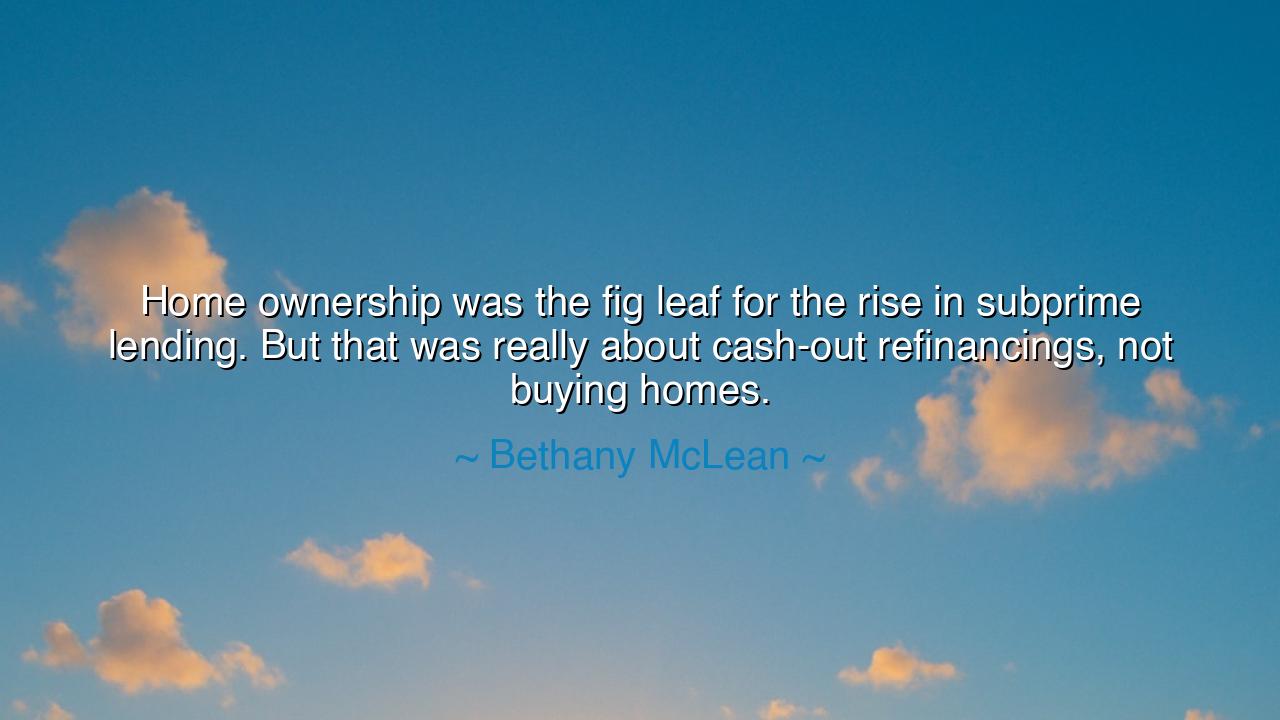
Home ownership was the fig leaf for the rise in subprime lending.
Home ownership was the fig leaf for the rise in subprime lending. But that was really about cash-out refinancings, not buying homes.






Hear now the piercing words of Bethany McLean, whose insight cuts through illusion like a blade through fog: “Home ownership was the fig leaf for the rise in subprime lending. But that was really about cash-out refinancings, not buying homes.” These words, though forged in the language of finance, are not merely about money or markets—they are about deception, greed, and the ways in which noble dreams are often cloaked in false virtue. In them lies a warning to all who live in civilizations of comfort: beware when the promise of prosperity hides a shadow, for beneath its gilded leaves may lie the serpent of ruin.
The origin of this quote rests in the days leading up to the great financial crisis of 2008, when nations built towers of wealth upon foundations of sand. The dream of home ownership—once sacred, a symbol of stability and self-determination—was transformed into a mask, a fig leaf covering the naked ambitions of lenders and investors. They spoke of helping families achieve the dream of owning their homes, but behind those honeyed words lurked another truth: much of this lending was not about creating homes, but about extracting wealth. People were encouraged to borrow against their houses, to turn walls of brick and memory into sources of endless cash, until the well ran dry and the edifice crumbled.
In the time of the ancients, such folly was not unknown. When the Roman Republic grew rich from conquest, its citizens, once humble farmers, became enslaved to debt and decadence. Gold replaced labor, and speculation replaced virtue. The Senate cloaked corruption in words of patriotism, just as financiers in the modern age cloaked greed in the rhetoric of economic opportunity. Rome too mistook illusion for prosperity—and when the debts could no longer be paid, her glory fell into ruin. Thus McLean’s words are not about modern finance alone—they are part of an eternal warning: when the pursuit of wealth divorces itself from truth, destruction soon follows.
The fig leaf, in her metaphor, is no idle choice. In the scriptures of old, Adam and Eve covered themselves with fig leaves to hide their shame. So too did the architects of the subprime era use the ideal of home ownership to hide the shame of their schemes. They promised ordinary people a piece of heaven, while quietly building a ladder to profit from their downfall. The subprime loans, offered to those least able to bear them, were painted as blessings but were in truth burdens. And when the storm came, millions lost not only their wealth, but their dignity and faith in the dream itself.
But within this tragedy, there is wisdom for all generations. It reminds us that good ideals can be corrupted, and that noble words can be used to disguise ignoble purposes. The desire for security and belonging is human and sacred—but when others exploit that yearning for gain, it becomes a weapon. The lesson is not to abandon dreams, but to guard them fiercely—to see through the masks of rhetoric, and to ask what lies beneath every promise of prosperity. For the true path to strength is not in endless borrowing, but in prudence, honesty, and balance.
We must also learn that wealth built on illusion cannot endure. A home is not a vault to draw from at will—it is a foundation for life. When societies teach their citizens to trade the future for the pleasures of the moment, they sow the seeds of their own undoing. Bethany McLean’s wisdom reminds us that financial systems, like moral systems, crumble when built upon deceit. Only when truth governs trade, and ethics guide ambition, can a people rise without falling.
Therefore, children of tomorrow, let this teaching be your compass: when you are offered easy gain, ask first whose dream it truly serves. Be vigilant against those who dress greed in virtue, and question the stories that sound too sweet. Build not on the quicksand of illusion, but upon the rock of understanding. For in every age, the fig leaf returns—new in form, but old in nature. To see beyond it is to preserve both wealth and wisdom. And remember: prosperity without principle is a palace without foundation—beautiful for a moment, destined for collapse.






AAdministratorAdministrator
Welcome, honored guests. Please leave a comment, we will respond soon